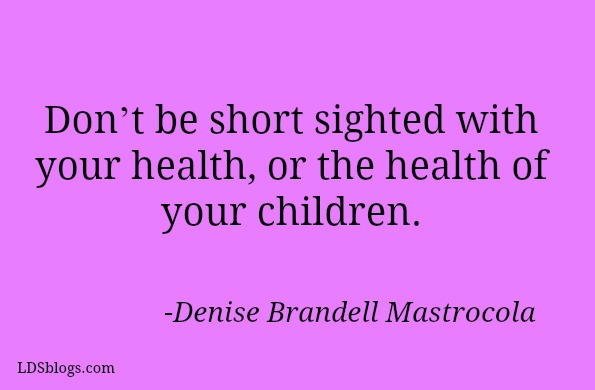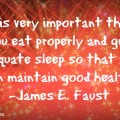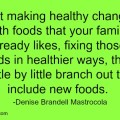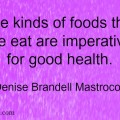**Disclaimer** While the word of wisdom gives us basic guidelines for health, it leaves the interpretation of those guideline up to the individual members. This blog is not intended to replace your medical professional or the divine revelation of the Word of Wisdom, but rather it is practical knowledge that I have accumulated over the years in my own pursuit of a healthier lifestyle which I am passing along in the hopes that it will benefit others.**
School lunch was disturbing even in my youth, but things have been changing since then. Most school cafeterias now have better choices than greasy pizza and chicken nuggets, the mainstays of a cafeteria meal when I was a kid, but in some ways things are worse.
In order to give your children the option of a salad bar and or any fruit choice that isn’t a piece of whole fruit, they are going to have to use a variety of preservatives to keep that food fresh, pre-packaged foods are in abundance, and GMOs will also be a problem because there are no labels in a cafeteria.
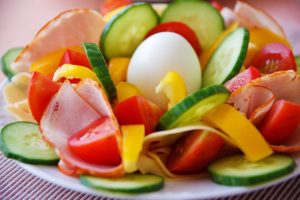 Unless you live on a large enough property to grow your own food, and unless you have enough left over after eating it fresh throughout the season to can or freeze the remainder, not to mention having the time to do all of that canning and freezing, you and your family will be eating foods that contain preservatives. It is an unavoidable part of our modern lives, but there are ways to minimize the amounts that we take in.
Unless you live on a large enough property to grow your own food, and unless you have enough left over after eating it fresh throughout the season to can or freeze the remainder, not to mention having the time to do all of that canning and freezing, you and your family will be eating foods that contain preservatives. It is an unavoidable part of our modern lives, but there are ways to minimize the amounts that we take in.
When they are at home we can control what our children eat, but once they reach school age, unless you are planning on a home education plan such as home schooling, unschooling, or a cyber school, you will need to think outside the box to make sure that your children are eating as healthy as possible when they are away from home.
Your first line of defense is to be an informed parent.
- Take a tour, whether virtual or in person, of your child’s school cafeteria.
- Ask questions about what foods are available and how they are prepared.
- Find out if they can bring their own lunch (in some schools you can’t).
- Look for vending machines that invite junk food consumption.
- Ask other parents or children what they think of the food available to them in school. If there are problems and enough people band together you can get changes made.
If your child is allowed to bring a lunch from home that is probably the best route to go. There are some nice organic breads available for making their sandwiches. Now I know, if your children have been used to white bread until now it may be hard for them to make the switch, we had the same problem at our house when I started learning about healthy eating. But after a period of time, when I didn’t really give them a choice, they got used to it and now my children prefer the multi grain organic bread that I buy for them.
If your children fight the whole grain bread, try toasting it. For many children this makes it more appealing, and after they get used to that you can let them try it untoasted. The same works for the gluten free breads if there is someone in your family with gluten sensitivity. Gluten free breads have improved greatly over the past few years, but I have found that for someone who is making the switch, toasting the bread makes it easier to get used to.
Since we are nearing the end of the school year, it may not make sense to try to change too much at once. Begin by making some small changes at first, and then over the summer when they are at home more you can work on making healthy choices more of a habit for them. Then next year will be easier.
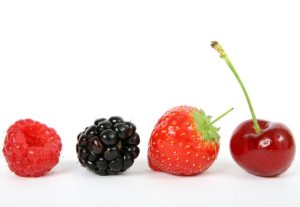 Pack organic carrots, apples, grapes, oranges, sliced peppers, or celery with a natural peanut butter spread on it and raisins or craisins dotted on top to give it an extra burst of flavor.
Pack organic carrots, apples, grapes, oranges, sliced peppers, or celery with a natural peanut butter spread on it and raisins or craisins dotted on top to give it an extra burst of flavor.
Make homemade cookies, brownies, or other treats to satisfy their sweet tooth without having to give them processed snacks that have too much sugar and unhealthy fats in them. But make sure that you use healthy ingredients yourself like Omega 3 fats and oils, and organic flour, milk, butter and cane sugar.
Organic foods are a little bit more expensive, but they are better for you, and the prices are going down.
It is all part of the supply and demand concept that we learned about in school when we were kids. If only a few consumers want something the store is going to stock just enough to make those customers happy. It is going to cost the store more to have a small shipment made so they pass that expense on to you. But if more customers begin to demand a particular product, the store will order in larger quantities to meet the demand, and that in turn gives them savings that they will pass along to you in lower prices.
For as long as I can remember it has been almost a competition for whoever does the grocery shopping in the family to keep the food bill within a strict budget. And while I completely see the need to have a budget and to stick to it, I am less convinced that our food budget is the one that should have the tightest purse strings. I have known many people who would buy the cheapest foods possible so that they would have enough money left over to go to the movies once a month, or to save up for a new television set, or name brand clothes etc. Maybe it is time to spend more on better food, and less on things we don’t really need.
If you only take the numbers at face value you can kind of see why people have this mind set but it is twisted logic, and if you follow it to conclusion and look at all of the facts from beginning to end, it makes far less sense.
Let’s follow the links in this chain of events and see what we find.
Let’s say we choose the cheapest food we can buy to keep within our budget. We will more than likely be buying canned or pre-packaged foods, processed meats and juice flavored drinks.
What do these foods do to our bodies, and what is the cost of eating this kind of a diet throughout our lives?
Well it is actually true that you are what you eat.
Cheap foods are made with cheap ingredients. Unhealthy fats, extra sugar and gluten fillers, in addition to artificial flavors and colors so that they will taste better. Over time these foods will make you sick.
Depending on your genetic mix it could mean diabetes, heart disease, cancer, obesity, or a host of other illnesses caused by poor lifestyle choices.

To read more of Denise’s articles, click here.
More and more people are beginning to understand the connection between what they eat, and how they feel, so hang in there and it will get easier. There is strength in numbers and the more we are able to get this information out there the more health conscious people will become.
Don’t be short sighted with your health, or the health of your children. Begin now to eat better, and the odds will be better that while you might spend a bit more on food now, you will probably spend a lot less at the doctor’s office and the gym in the future!
resources:
http://www.nettally.com/prusty/formj.htm
About Denise Mastrocola
Denise is a Michigander turned Pennsylvanian, who has been writing stories since Elementary School. Denise won an award at the annual Lansing Youth Talent Show, when she was in 10th grade, for a short story entitled Procrastination is Fatal, but didn’t decide on writing as a career until she was 28 years old. While homeschooling her older children she spent 4 years working through a course from The Institute of Children’s Literature.
Through the years Denise’s children have had a variety of health issues, many of which have been linked to various sensitives; having spent more than 20 years researching and trying different things Denise has a boots on the ground view on healthier living.
Denise currently writes for 2 blogs and has several books in different stages of completion. She is planning to break ground in e publishing, and hopes to have her first Historical Fantasy book which is set during the renaissance, “Lisa, My Lisa?” ready by the first of the year.
Twitter •

